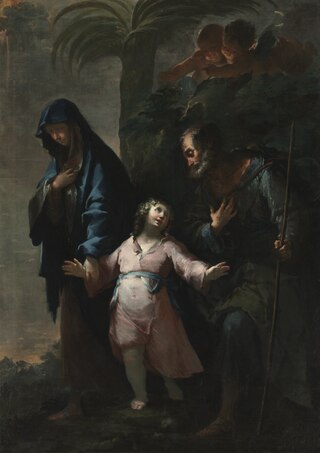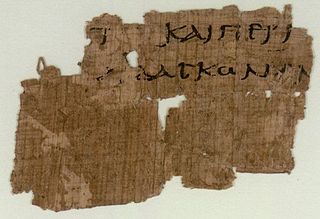Related Research Articles

Herod Antipas was a 1st-century ruler of Galilee and Perea. He bore the title of tetrarch and is referred to as both "Herod the Tetrarch" and "King Herod" in the New Testament. He was a son of Herod the Great and a grandson of Antipater the Idumaean. He is widely known today for accounts in the New Testament of his role in events that led to the executions of John the Baptist and Jesus of Nazareth. His father, Herod the Great, was described in the account as ordering the Massacre of the Innocents, marking the earliest Biblical account of the concerns of the government in Jerusalem regarding Jesus's existence.

Matthew 2:12 is the twelfth verse of the second chapter of the Gospel of Matthew in the New Testament. The magi, dispatched by King Herod, have found and paid homage to the Infant Jesus. In this verse this they return home rather than to Herod.

Matthew 2:23 is the twenty-third verse of the second chapter of the Gospel of Matthew in the New Testament. The young Jesus and the Holy Family have just returned from Egypt and in this verse are said to settle in Nazareth. This is the final verse of Matthew's infancy narrative.

Matthew 3:1 is the first verse of the third chapter of the Gospel of Matthew in the New Testament. This verse takes up the narrative some thirty years after Matthew 2:23, beginning the account of Jesus' ministry. This verse introduces the figure of John the Baptist.

Matthew 4 is the fourth chapter of the Gospel of Matthew in the New Testament of Christian Bible. Many translations of the gospel and biblical commentaries separate the first section of chapter 4 from the remaining sections, which deal with Jesus' first public preaching and the gathering of his first disciples.

Matthew 4:12 is the twelfth verse of the fourth chapter of the Gospel of Matthew in the New Testament. The temptation scene has just ended, and this verse begins the introduction to the discussion of the Ministry of Jesus, which makes up the bulk of the gospel narrative. Jesus' ministry in Galilee extends from this verse as far as Matthew 18:35.

Matthew 4:16 is the sixteenth verse of the fourth chapter of the Gospel of Matthew in the New Testament. In the previous verses Jesus returned to Galilee after hearing of the arrest of John the Baptist and then left Nazareth for Capernaum. This verse contains the second half of a quote from the Book of Isaiah, implying that these movements were preordained by scripture.

Matthew 4:17 is the seventeenth verse of the fourth chapter of the Gospel of Matthew in the New Testament of the Christian Bible. In the previous verses Jesus returned to Galilee after hearing of the arrest of John the Baptist and then left Nazareth for Capernaum. This verse reports that once in Capernaum, Jesus began to preach.

John 4 is the fourth chapter of the Gospel of John in the New Testament of the Christian Bible. The major part of this chapter recalls Jesus' interaction with the Samaritan woman at the well in Sychar. In verses 43-54, he returns to Galilee, where he heals a royal official's son.

Luke 3 is the third chapter of the Gospel of Luke in the New Testament of the Christian Bible, traditionally attributed to Luke the Evangelist, a companion of Paul the Apostle on his missionary journeys. It contains an account of the preaching of John the Baptist as well as a genealogy of Jesus. From the start of this chapter until Luke 9:50, the "shape and outlook" of Luke's Gospel follow closely those of the other synoptic gospels, Matthew and Mark. The Expositor's Greek Testament states that in this chapter "the ministry of the new era opens".

Matthew 14 is the fourteenth chapter in the Gospel of Matthew in the New Testament section of the Christian Bible. It continues the narrative about Jesus' ministry in Galilee and recounts the circumstances leading to the death of John the Baptist.

Matthew 10:2 is the second verse in the tenth chapter of the Gospel of Matthew in the New Testament.
Matthew 11:14 is the fourteenth verse in the eleventh chapter of the Gospel of Matthew in the New Testament.
Matthew 14:1 is the first verse in the fourteenth chapter of the Gospel of Matthew in the New Testament.
Matthew 14:2 is the second verse in the fourteenth chapter of the Gospel of Matthew in the New Testament.
Matthew 14:4 is the fourth verse in the fourteenth chapter of the Gospel of Matthew in the New Testament.
Matthew 14:12 is the twelfth verse in the fourteenth chapter of the Gospel of Matthew in the New Testament. It refers to the death of John the Baptist and the burial of his body.

The return of the family of Jesus to Nazareth, also known as the return from Egypt, appears in the reports of the early life of Jesus given in the canonical gospels. Both of the gospels which describe the nativity of Jesus agree that he was born in Bethlehem and then later moved with his family to live in Nazareth. The Gospel of Matthew describes how Joseph, Mary, and Jesus went to Egypt to escape from Herod the Great's slaughter of the baby boys in Bethlehem. Matthew does not mention Nazareth as being the previous home of Joseph and Mary; he says that Joseph was afraid to go to Judea because Herod Archelaus was ruling there and so the family went to Nazareth instead. The Gospel of Luke, on the other hand, does not record the flight to Egypt, and says that Joseph had been previously living in Nazareth, and returned there after the Presentation of Jesus at the Temple.
Matthew 14:6-7 is a set of verses in the fourteenth chapter of the Gospel of Matthew in the New Testament.
Matthew 14:9-11 are verses in the fourteenth chapter of the Gospel of Matthew in the New Testament.
References
- ↑ Robert Witham, Annotations on the New Testament of Jesus Christ. Dublin: 1730.
- ↑ John MacEvilly, An Exposition of the Gospel of St. Matthew consisting of an analysis of each chapter and of a Commentary critical, exegetical, doctrinal and moral, Dublin, Gill & Son 1879.
- 1 2 "Catena Aurea: commentary on the four Gospels; collected out of the works of the Fathers. Oxford: Parker, 1874. Thomas Aquinas".
 This article incorporates text from this source, which is in the public domain .
This article incorporates text from this source, which is in the public domain .